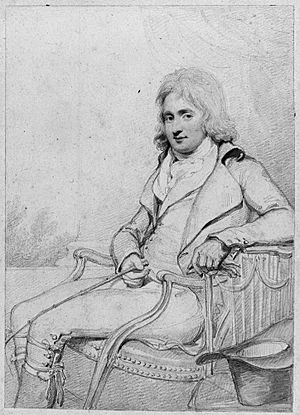Charles Ellis, 1st Baron Seaford facts for kids

Charles Rose Ellis, 1st Baron Seaford (born December 19, 1771 – died July 9, 1845) was a British politician. He was also a sugar planter and owned many enslaved people.
Contents
Charles's Early Life and Family Wealth
Charles Rose Ellis was the second son of John Ellis. His father, John, became very rich from sugar plantations in Jamaica. These plantations used the forced labor of enslaved people. Some of his father's estates included Montpelier, Newry, and Palm.
When John's brother George died young, John managed his nephew George Rose Ellis's estates. John Ellis owned over 1,200 enslaved people across six estates in Jamaica. He was one of the wealthiest sugar planters in Jamaica.
In 1782, Charles's parents, John and Elizabeth, were lost at sea while traveling from Jamaica to England. Charles then inherited his father's valuable properties in Jamaica.
Managing Sugar Plantations
Charles Ellis went to Christ Church, Oxford university. He became an "absentee planter," meaning he lived in England but owned and managed his plantations in Jamaica from afar.
His cousin, George Rose Ellis, passed away in 1815 without children. Charles then inherited even more property, including the Montpelier estate. His older brother, also named John, had inherited other family properties. However, John died in 1832 with many debts. Charles then took over his brother's properties as well.
When the British government ended slavery in the 1830s, Charles received a large payment. This payment was compensation for the enslaved people he "lost" when they were freed. He received over £18,000, which was a huge amount of money at the time.
Charles's Political Career
Charles Ellis was elected to the British House of Commons, which is part of the British Parliament. He represented different areas over the years. He was a Member of Parliament (MP) for Heytesbury from 1793 to 1796. Then he represented Seaford from 1796 to 1806 and again from 1812 to 1826. He also represented East Grinstead from 1807 to 1812.
In 1826, he was given a special title and became Baron Seaford. This meant he joined the House of Lords, another part of Parliament.
In Parliament, Charles Ellis strongly defended slavery on the West Indies plantations. For many years, he was seen as the leader of the "West India Interest." This was a group of plantation owners and merchants in Parliament. They worked against those who wanted to end slavery.
In 1809, Charles Ellis was involved in a famous duel. He was the second for his friend, Foreign Secretary George Canning. Canning had a disagreement with another politician, Robert Stewart, Viscount Castlereagh. During the duel, Canning was wounded, and Castlereagh was grazed by a bullet. Charles Ellis and Castlereagh's second stepped in to stop the fight.
End of Slavery and New Plans
In 1832, Charles Ellis was in Jamaica during a major slave rebellion. This rebellion was led by Samuel Sharpe. Charles suffered big financial losses on his sugar plantations, losing about £41,000.
Lord Seaford left Jamaica in mid-1834. This was just before a new period called "Apprenticeship" began. This period was a step towards fully freeing the enslaved people.
According to the Legacies of British Slave-Ownership at University College London, Lord Seaford received compensation after the Slavery Abolition Act 1833. He was paid over £18,000 for 1,018 enslaved people who were freed from his estates.
Lord Seaford was not sure the Apprenticeship system would work well. He believed it would be better to encourage white European people to move to Jamaica. To help with this, he gave land from his Montpelier estate. This land was used to create a village for German immigrants. The village was named Seaford Town, Jamaica after him.
Death and Family
Lord Seaford died on July 9, 1845. He had married Elizabeth Catherine Caroline Hervey in 1798. She passed away in 1803. They had two sons and one daughter.
Their oldest son, also named Charles, became the sixth Baron Howard de Walden in 1803. Their second son, Augustus Frederick Ellis, became an army officer.
 | Jewel Prestage |
 | Ella Baker |
 | Fannie Lou Hamer |

